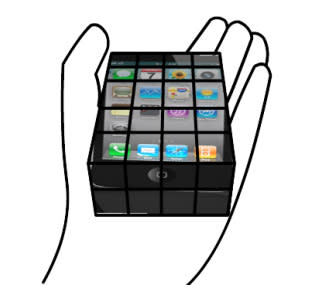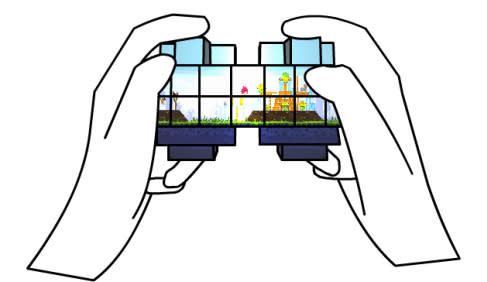Tiny touchscreen building blocks could be the future of consumer electronics

What does the future look like? Will floating autonomous cars cart us to and from work each day? Will we even have jobs anymore or will robots invade every industry from manufacturing, to trucking, to law and everything in between? The future has never looked less clear than it does right now, but a new prototype of a device called "Cubimorph" may help bring the future of consumer electronics into focus.
MUST READ: The 5 biggest ways Captain America: Civil War failed
Born in a lab in the Department of Computer Science at the University of Bristol in conjunction with researchers at the Universities of Purdue, Lancaster and Sussex, Cubimorph is described as an interactive mobile device that can change shape on demand to suit a wide range of use cases. More specifically, it's a series of small touchscreen building blocks that can be combined in any number of ways to suit different needs.
"Cubimorph contributes toward the vision of programmable matter where interactive devices reconfigure in any shape that can be made out of a chain of cubes in order to fit a myriad of functionalities," the researchers said in their abstract.
The device's modular three-dimensional design uses a series of hinges to connect the cube components, which have touchscreens on each of their six sides. Motors inside the cubes allow the device to reconfigure itself on the fly based on different use cases.
So, for example, Cubimorph might spend the bulk of its time during the day as a smartphone that looks something like this:

But when the user wants to play a mobile game, Cubimorph doesn't just open an app, it reconfigures itself and becomes a touch-controlled game pad:

Microprocessors are growing increasingly powerful while shrinking in size. New wireless radios are smaller and more efficient. Touchscreen displays are becoming sharper and edgeless designs are on the horizon. Game-changing truly wireless charging technology has the potential to completely eliminate the need for ports. Why shouldn't one device serve as all your devices in the near future? A self-configuring modular device like the Cubimorph could be a tablet when you're on your couch, a smartphone while you're on the go, a gaming pad when you want to unwind, and a laptop computer when it's time to work.
Led by Dr. Anne Roudaut, the team of researchers will show off their Cubimorph prototype this week during the ICRA 2016 conference in Stockholm, Sweden. A video further detailing their concept and prototype is embedded below.
Related stories
Experiment finds hundreds of 'dirty photos' can be recovered from used phones
What it's like to completely give up your smartphone for 18 months
Remarkable new sensor chip pulls power out of the air so it never needs to be charged
More from BGR: Motorola just launched a dirt cheap phone that takes better photos than the iPhone 6s
This article was originally published on BGR.com

